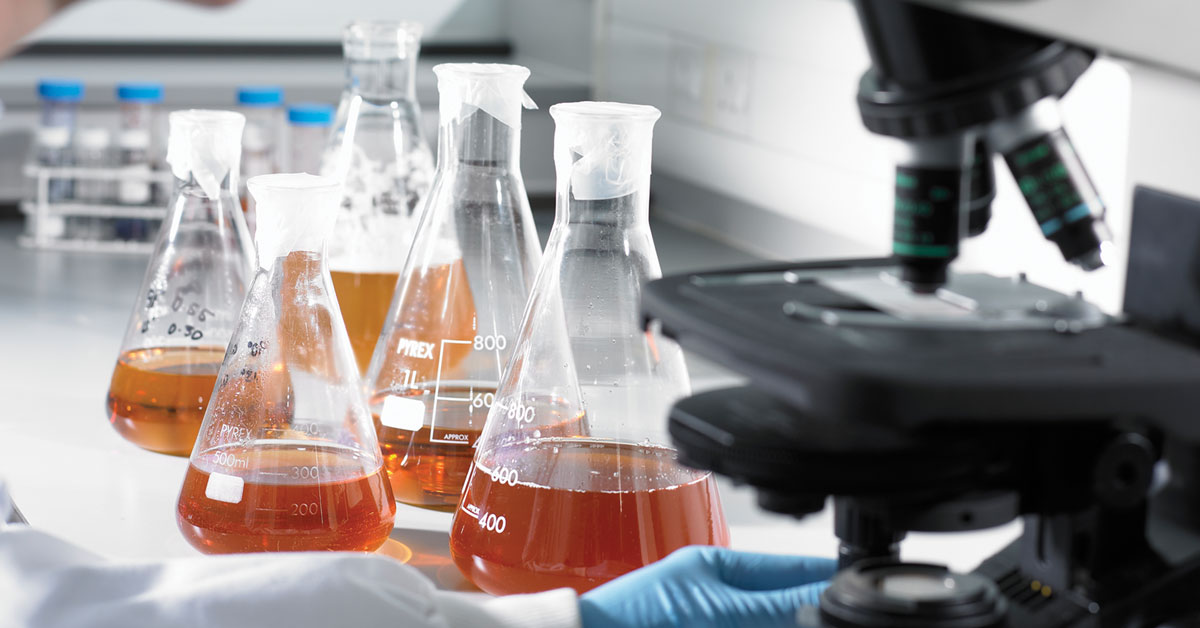
Our new pasteurisation optimisation research
1 October 2024 | Greg Rachon, Section Lead Brewing Microbiology Research
The minimum pasteurisation level for many current and new beverages is still unknown. Meaning that many beverage manufacturers may be overprocessing their drinks – potentially wasting time, energy and money, and perhaps even compromising on product quality.
Our work has shown that effective pasteurisation for selected microorganisms in beer can be achieved at significantly lower PU values than those typically used and recommended within the industry. Our results from tunnel pasteurisation (with lagers, hard seltzer, cider and low pH non-alcoholic beverages) has also shown that many of these beverages are typically over-pasteurised.
While we already offer pasteurisation optimisation for tunnel pasteurisation, there is not enough evidence to justify use of recently validated pasteurisation bio indicator (yeast ascospores) for use in flash pasteurisation optimisation and therefore more research in this area is needed.
Furthermore, our recently published research showed that at higher temperatures (> 65°C) Enterococcus faecium NRRL B-2354 maybe more heat resistant than yeast ascospores and therefore be more suitable to use as a indicator of flash pasteurisation.
Our current study is to demonstrate that yeast ascospores can be used as a pasteurisation bioindicator for the validation of flash pasteurisation for various alcoholic and alcohol-free beverages.
The study
The research will provide heat resistance evidence of yeast ascospores and Enterococcus faecium at flash pasteurisation temperatures.
Key elements of the study include:
- A minimum of ten different beverages (alcoholic and alcohol-free beers, ciders and cocktails, soft drinks, and more) will be tested.
- D and z-values of our yeast ascospores bioindicator and Enterococcus faecium NRRL B-2354 will be determined in each liquid, at 4 - 5 different pasteurisation temperatures (65 - 80°C), using the flask method.
- The optimised pasteurisation level will be calculated for each beverage and verification trials will be performed in a pilot plant flash pasteuriser.
Participating members supporting this project will receive heat inactivation data for their product, regular updates about progress of this project, and access our unique flash pasteurisation optimisation service.
Benefits of optimising your pasteurisation process
Efficiency – Optimising pasteurisation facilitates a safe, verified process in which the product is being pasteurised for less time / at a faster flow rate, compared to following outdated, non-optimised industry norms. Optimising can therefore save time and improve your output and efficiency.
Sustainability – Ensuring that products are not overprocessed can result in a less intensive pasteurisation process that lowers energy usage. Pasteurisation optimisation can therefore be a great step to take when looking to reduce the environmental impact of your operation.
Reduced costs – Increased efficiency and especially reduced energy usage both enable you to reduce running costs by optimising your pasteurisation process.
Improved taste – Overprocessing of beverages may result in damage to aroma and flavour compounds. Optimising can introduce a less intensive pasteurisation process that prevents overprocessing, thereby protecting and benefiting your product’s sensory characteristics.
Safety and quality – Validating your process is essential as it allows you to guarantee that your process is safe and microbiologically stable. It also gives you the ability to manage risk when the process fails (e.g. pasteuriser fails, temperature not reached, target PU not achieved), so that you have the necessary information for decisions to be made immediately.
Safety considerations for new beverages – There are safety considerations for new, especially low alcohol and non-alcoholic, beverages, because there is huge uncertainty of how to pasteurise these unique, newly developed products. Pasteurisation verification trials help you to determine a safe process for your new product, and also enables you to have an optimised process from the outset, ensuring not only a safe product but also one that is not affected by the negative sensory or cost impacts of overprocessing.
Optimise now for a more profitable future
By performing optimisation trials, we offer pasteurisation optimisation for premium beers, low / no alcohol beers, wines, cocktails and any other low pH beverages.
Our pasteurisation optimisation services are designed to help the industry to reduce costs, and save energy and time, while maintaining the highest product quality. We use a heat resistant yeast ascospore pasteurisation indicator and ensure a robust validation.
Get in touch to find out how we can help you gain the benefits of optimising your pasteurisation.

About Grzegorz Rachon
Grzegorz (Greg) is a microbiology expert who has been in the food industry since the early 2000s, and has been working at Campden BRI since 2016. He has PhD from Reading University and Birmingham University, as well as extensive expertise in pasteurisation optimisation of beverages, process validation, and stability of traditional and novel beverages.
How can we help you?
To find out more about the project and enquire about pasteurisation optimisation services, contact our support team to find out how we can help.
Are you a Campden BRI member who attends the MIG meetings?
- If not, you’re missing out on a whole host of exclusive benefits such as learning from industry-leading experts and networking with peers to overcome your challenges.







